Bermuda grass is the lush, green and carpet-like grass that can be often found on golf courses, sports fields and other turf areas with high foot traffic. It is quite drought and heat-resistant, and it recovers from damage rather quickly. The combination of these qualities also makes it a favorite of lawn owners and gardeners in southern areas of the country. However, maintaining a thick Bermuda grass lawn takes a lot of work. In this article, you will learn how to make bermuda grass thicker.
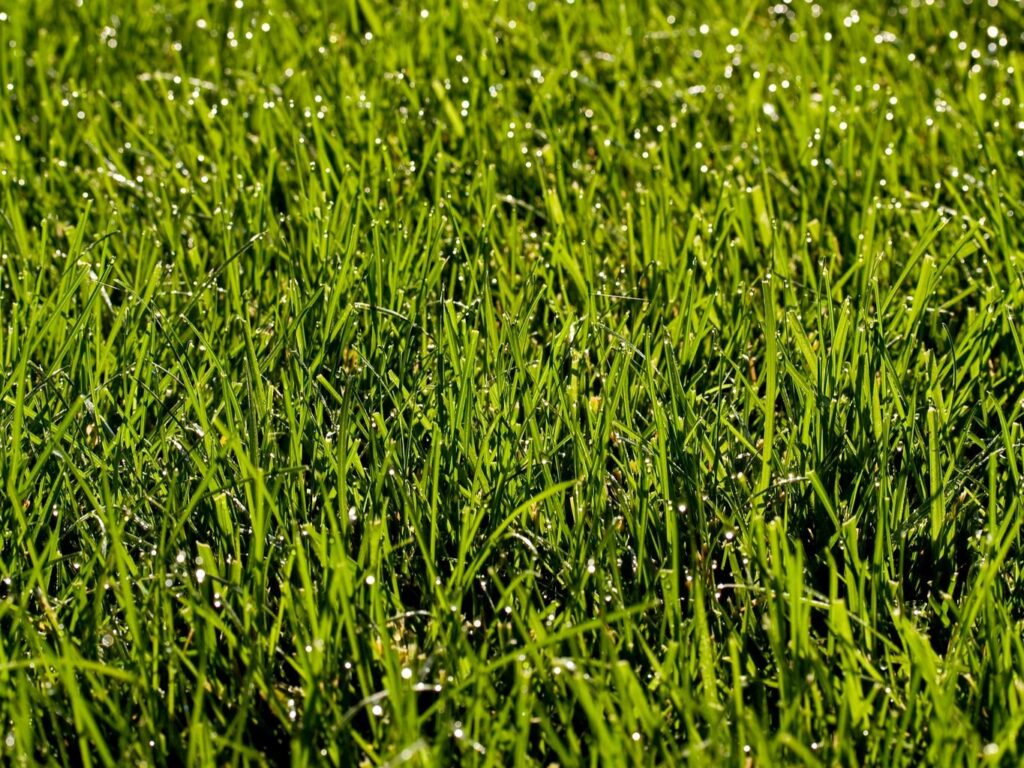
Mowing Bermuda grass frequently will help you create a dense Bermuda grass turf.
Lawn diseases, poor soil quality, too much shade, lawn insects, and grass weeds can all ruin a perfectly alright Bermuda lawn. Under the influence of any of the factors mentioned above, Bermuda grass lawns will start thinning and appearing pale. However, do not worry. We have got you covered.
In this article, we will look at some of the most effective tips and tricks that can help you grow a healthier and thicker Bermuda grass lawn. We will also tell you the best time to overseed Bermuda grass lawns and what you can do to make your grass clean, green, and serene. Happy Reading!
How Do I Make My Bermuda Grass Thicker?
To create a healthier, thicker, and greener lawn, you must follow a proper lawn care schedule. For a more significant impact on the existing lawn Bermuda grass, you will also need to use fertilizers and weed killers from time to time. In addition, we highly recommend taking a soil test if you are about to plant a new Bermuda grass lawn using sod or Bermuda grass seed. A soil test can tell a lot about the quality and composition of your soil. This information is critical for creating and maintaining a thicker lawn in both the short and long term.
Nonetheless, here are a few ways to promote healthy growth in your Bermuda grass lawn and make it turn green and thick.
RELATED: When To Overseed Bermuda Grass: The Best Time And The Dos and Don’ts
Mow Lower & Mow Frequently
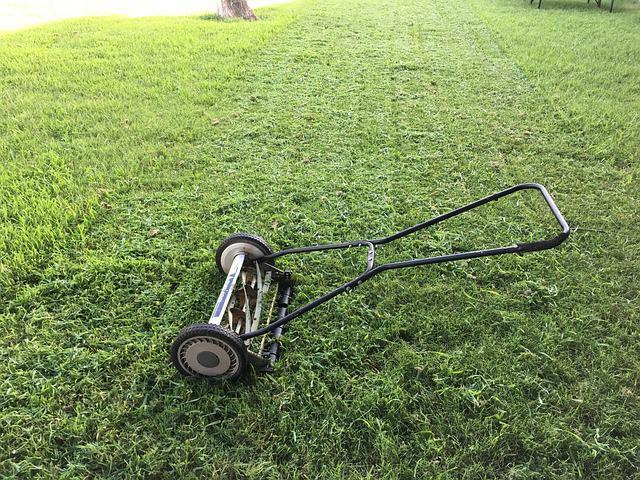
Bermuda grass grows vigorously if it is mowed lower and more frequently.
If you want a thicker lawn, mowing frequently can help you achieve that. Mowing Bermuda grass promotes lateral growth instead of vertical grass growth. So, what is the best mowing height for the Bermuda grass? Well, we suggest that you mow your grass slightly llower than one inch. To do this, you will need the right kind of lawn mower. We recommend using reel mowers to do the job. However, make sure that the blades are sharp so that the mower creates a nice and clean cut.
Using a mower with a blunt blade will produce unequal cuts, making your Bermuda lawn look pale and raggedy. Blunt cuts to the grass blades can also make your Bermuda lawn prone to fungal diseases such as brown patch disease and spring dead spot disease. However, make sure that you do not mow too close to the ground. Cutting too low comes with the risk of scaling, which can affect Bermuda grass lawn health.
Besides mowing lower, another way to encourage lateral growth is to mow Bermuda lawn more frequently. It will encourage Bermuda grass to start growing sidewards rather than growing upwards. Frequently mowing Bermuda lawns also stimulates vigorous grass growth, and it can help you attain a dense turf in no time. Leave the grass clipping on the lawn afterward. The grass clippings decompose quickly, adding nutrients back to the soil.
However, that is not all. If you want to make Bermuda grass thicker on your lawn, you will also have to feed and water the grass adequately, especially during the growing season. We have discussed these points further in the paragraphs given below.
Overseed The Lawn
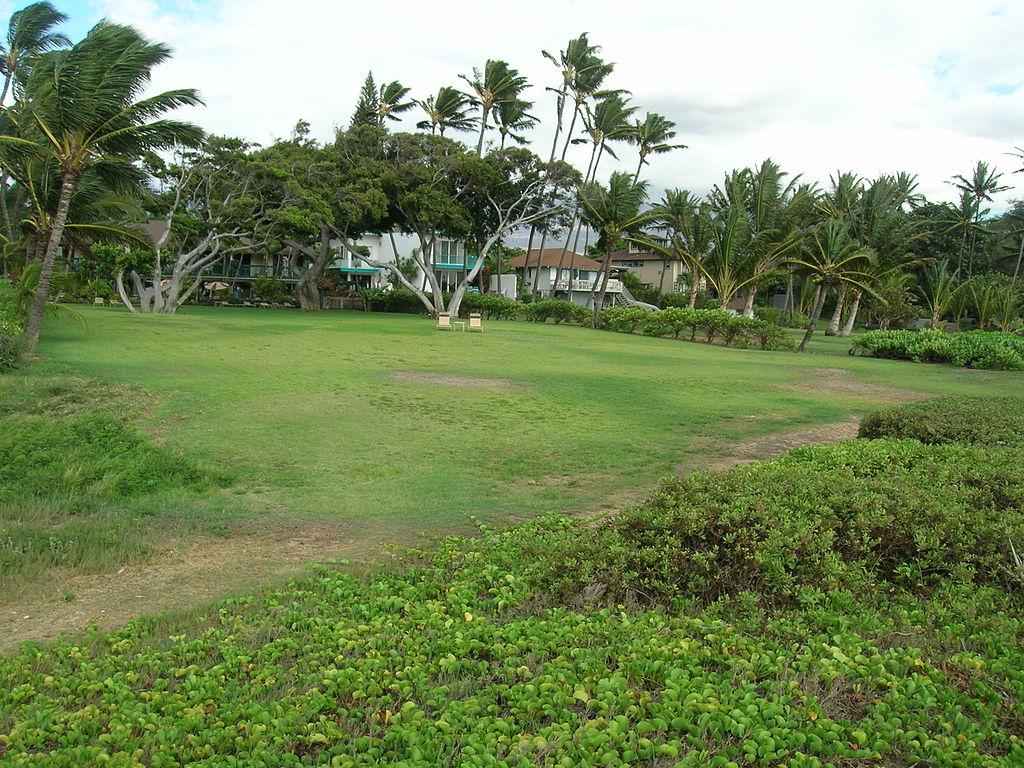
Overseed Bermuda grass to avoid thinning and promote thick lawns.
Another great way of fixing a patchy Bermuda grass lawn is overseeding. Patchy or thin Bermuda grass lawn is usually caused by soil compaction, lack of nutrients, too much shade, and poor drainage. Thin lawns are not aesthetically pleasing, and they are also prone to heavy weed infestation. So, to make Bermuda grass thicker on your lawn, you can fill in thin areas with Bermuda seed for a thicker growth and a healthier lawn.
The new grass growth will fill up the bare spots on your lawn, and soon you will have a green lawn with a dense turf. We suggest that you seed your lawn in fall as it is followed by spring which is the active growing season for the Bermuda grass. If you have a thin lawn because your Bermuda grass has entered dormancy, you can also overseed your lawn with cool-season grass.
Cool-season grasses remain active even when Bermuda stops growing and turns pale or brown in winter’s cold, harsh months. However, some people do not mind waiting out the Bermuda dormancy period and want their lawn to look uniform, all across. If you are one of these people, make sure that you always use the best quality seeds on your lawn.
In addition to that, you will also have to take care of your lawn correctly if you want to make your lawn grow thicker. For instance, you will need to apply a pre-emergent herbicide to kill weeds on your lawn before you overseed it. It is because weeds can compete with the new grass plants and will not let them grow thicker. However, do not use herbicides close to the time of overseeding. Some herbicides can also prevent the grass seeds from sprouting.
RELATED: How To Get Bermuda Grass To Spread Fast | Bermuda Grass Lawn Care Tips
Fertilize Your Lawn
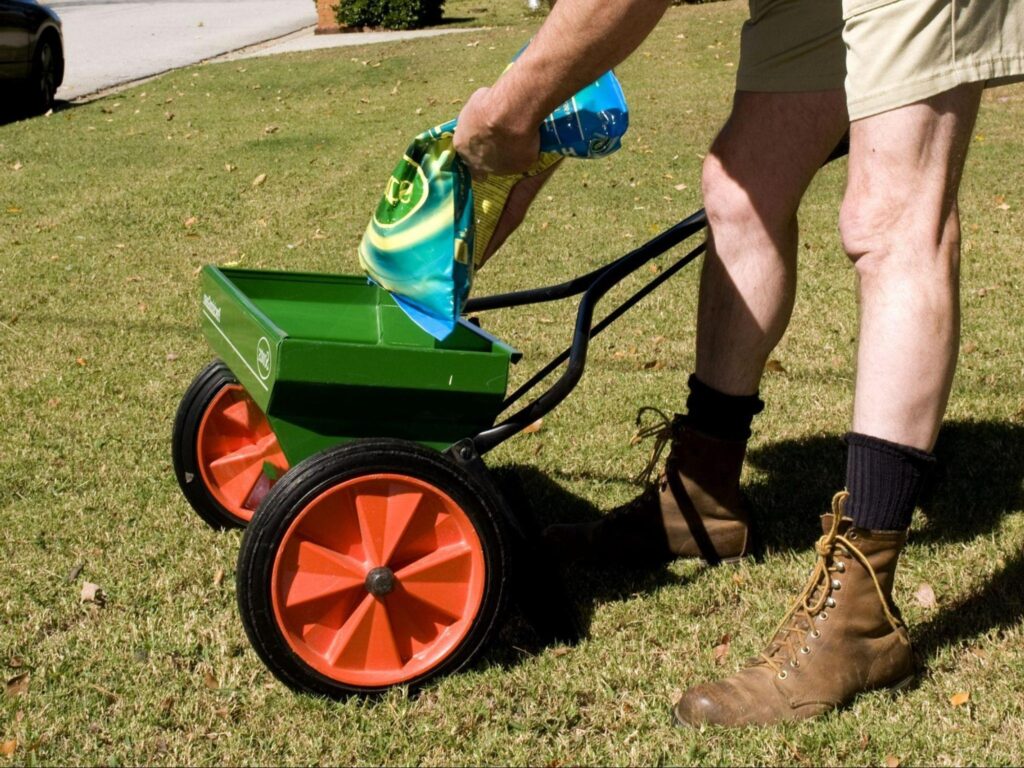
Use a slow-release fertilizer to prevent fertilizer burn and fungus/weed growth on the lawn.
Under fertilized soil is another reason why sometimes Bermuda grass fails to grow to its full potential. We strongly suggest that you get a soil test to tell you what nutrients your lawn soil lacks. Spring and early summer is usually the best time to add fertilizer to Bermuda grass turf. A healthy lawn soil also stops weeds and insects from taking hold of your lawn, making your Bermuda lawn more resilient overall.
In general, you can apply 1 to 1.5 pounds of nitrogen fertilizer per 1,000 square feet every 4 to 10 weeks. If you do not have soil test information, we suggest that you either use a nitrogen-only fertilizer or a fertilizer that has low amounts of phosphorus in it. Also, make sure you use a slow-release nitrogen fertilizer. Too much nitrogen can promote fungus growth or lead to a nitrogen burn.
If you have overseeded your Bermuda grass, we suggest that you fertilize your grass once in December and then again in February. However, do not fertilize the lawn right before overseeding the Bermuda grass. It is because nutrient-rich bare spots on lawns are the perfect places for weeds to grow. So, wait for the seedlings to grow and develop grass roots. That way, they will have a much better chance of outgrowing any potential weed problem.
Also, keep in mind that overfertilization can be just as devastating for the lawn as under fertilization. An increased concentration of salts and other nutrients in the soil can mess up the soil’s chemistry. In addition, the accumulation of certain elements in the soil can impact both grass health and soil health. So, get your soil tested and fertilize the lawn accordingly.
Water Deeply and Infrequently
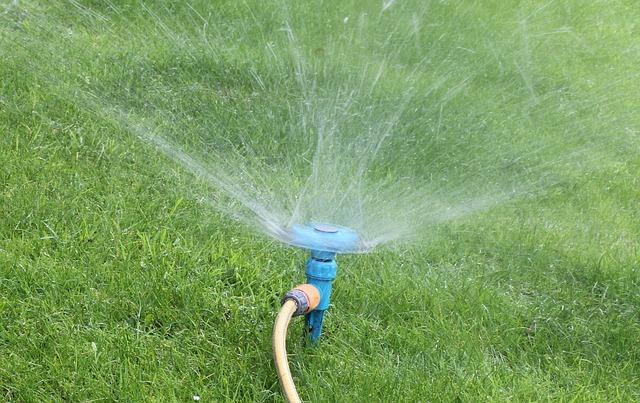
Water sprinklers are the best way to ensure uniform watering all across the lawn.
Drought stress can also be why you have a thin Bermuda grass turf despite all the fertilization and frequent mowing. Bermuda grass needs at least one inch of water per week during the summer and spring months. If it does not receive adequate water, the grass will start to turn thin and patch. In addition, if the dry soil conditions persist, you will end up with many patches of dead grass on your once green and lush turf.
Proper grass irrigation encourages root development, nutrient absorption, and overall grass growth. Depending on the soil type, watering needs will vary from place to place. For instance, sandy soil needs more watering than clay soil. So, if your turf is established on sandy soil, water your lawn every three to four days.
However, for clay soils, we recommend that you water the lawn infrequently but slowly and deeply. It is because the clay soil holds water for much longer than the sandy soil. And the resulting water savings (aka lawn maintenance costs) will pay for your time in a matter of just a few seasons. Also, deep watering causes the roots to grow deeper and thicker, which will improve the drought resistance and resilience of your grass.
Also, make sure that your lawn does not stay wet for prolonged periods of time. Wet conditions promote fungal growth, which could ruin the quality of your turf. We suggest that you water your grass early in the morning. That way, any excess water standing on the soil surface will evaporate during the day.
Overwatering the lawn can also make your lawn more prone to certain lawn diseases and water bugs. Standing water on the soil surface also creates compaction issues which can hinder root development and the spread of the grass.
Improve Soil Quality
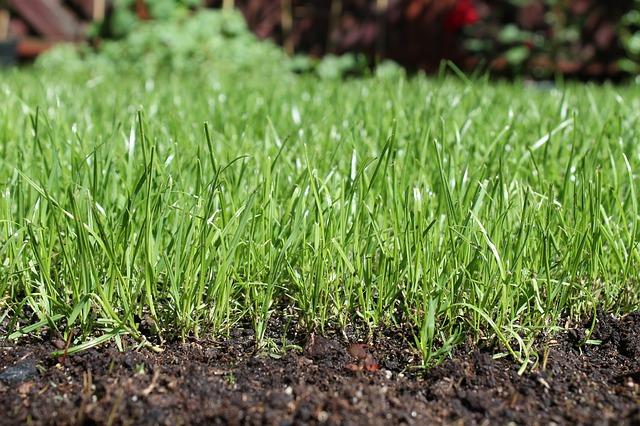
If your grass is growing poorly or showing stunted growth, it might be due to the poor quality of the soil. Among soil quality issues, soil pH is usually a major cause of poor lawn growth. So, make sure that you get a soil pH test if your grass is suffering from stunted growth.
Bermuda grass grows the best when soil pH is between 5.8 and 7.0. It can also tolerate slightly alkaline soils. However, if conditions become too acidic or too alkaline, all your efforts to make Bermuda grass thicker will go in vain. To treat acidic soils, you can apply some lime which will fix the soil pH back to normal.
Besides pH, soil aeration or drainage problems can also hinder normal grass development. So, make sure you do not have any blocked drainage pipes or soil aeration issues. You can also amend the soil quality by adding topsoil or mulch. It will improve the soil quality while also fixing any potential weed problems.
Control Weeds
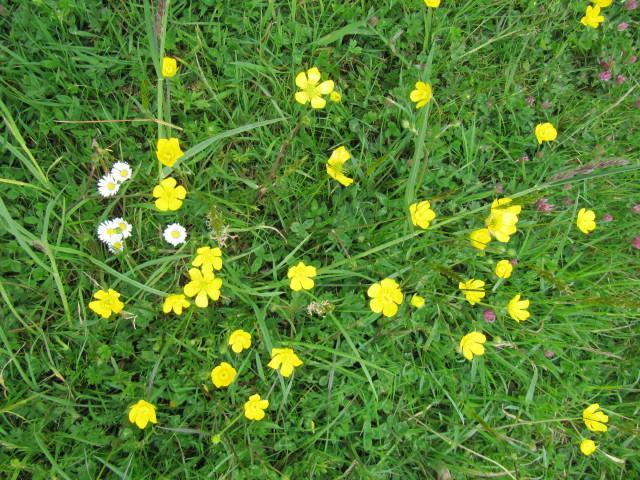
Post-emergent herbicide is the best way to control existing weeds on your lawn.
Weeds can compete with the grass for nutrients, space, and water. Some weeds, such as crabgrass, grow very aggressively and can quickly choke out the native grass if not controlled. It can be challenging to make Bermuda grass thicker if it is already fighting a weed infestation. Broadleaf grassy weeds are especially harmful to a Bermuda grass turf.
So, you will need to use a weed killer from time to time on your Bermuda grass lawn. Various weed killers are available in the market with pre-emergence and post-emergence applications. If you are going to use a pre-emergent weed killer, do it early in the spring. That way, new grass coming out of dormancy will have a better chance to compete against weeds.
For post-emergent herbicides, make sure that you keep an eye out for any visible weeds and use the herbicide as soon as possible. It is because controlling weeds can be tricky once they flower or set seeds. In many cases, weed seeds can stay dormant for long periods and come to life once the herbicide fades off.
Dethatch Your Lawn
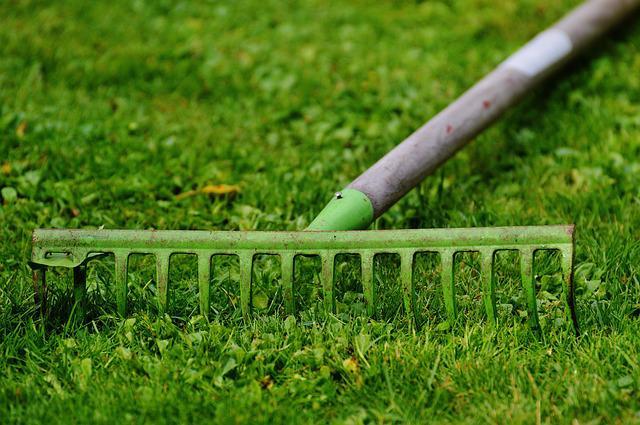
Do not dethatch dormant grass. It can damage or kill the grass.
If there is more than half an inch of thatch on your grass, you should remove it as soon as possible, especially during the growing season. Thatch can become a barrier between the underlying grass and the environment. It can prevent water and air from penetrating into the soil. Thatch buildup also increases the incidence of disease and weed infestation.
Thatch buildup can also make your grass surface spongy. A spongy lawn surface can decrease the efficiency of your mower, which will cause another plethora of problems for your lawn. However, do not dethatch your yard when it is dormant. If you dethatch your yard during its dormancy, there is a very high chance that you will damage or kill it.
You can also combine overseeding with the dethatching process to make your lawn grow greener and thicker. Dethatching itself is a pretty simple procedure. You can do it with a simple rake. However, you can also use a power rake depending on your needs.
Nonetheless, do not stress over the type of rake you use. Just make sure that you rake deep and remove as much thatch as possible.
Aerate Your Lawn
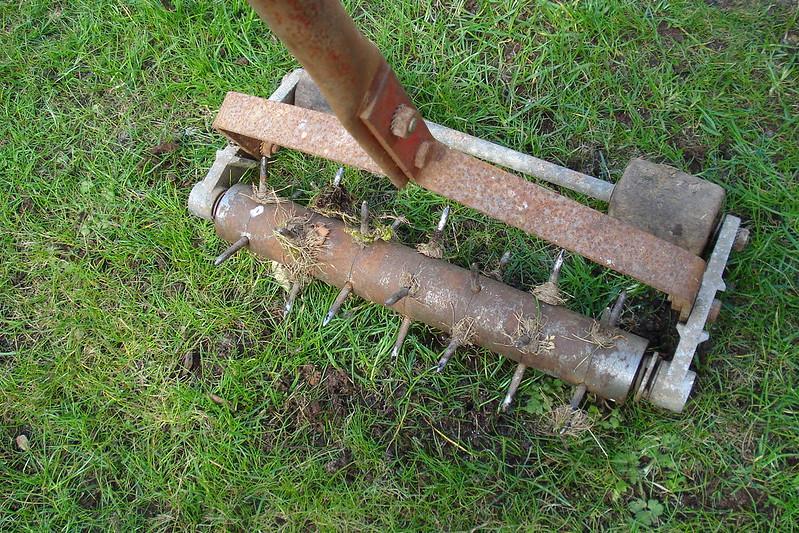
Aeration helps grass roots go deeper and develop stronger.
Compacted soil is another reason you might suffer from poor grass development. A hard-packed soil makes it difficult for the grass roots to grow deeper. If not corrected with core aeration in time, the grass can be weaker and prone to lawn diseases. We suggest that you aerate your lawn every season to help your Bermuda grass grow healthier and thicker.
Aeration helps the nutrients, water, and air reach deeper into the soil, promoting grass growth. Lawn aeration can also help solve any potential drainage issues on your lawn. We suggest you aerate your lawn in the spring or early summer when the Bermuda grass is in its peak growing time. During these times, grass plants will have more stored energy. Therefore, they will significantly benefit from the aeration of the lawn.
Do not aerate the lawn during its dormancy period as it will encourage weed growth. Also, if your Bermuda grass is growing on clay soils, you should aerate your lawn two times in a season. Again, it is because clay soil gets compacted more quickly than other soil types.
Improve Sunlight
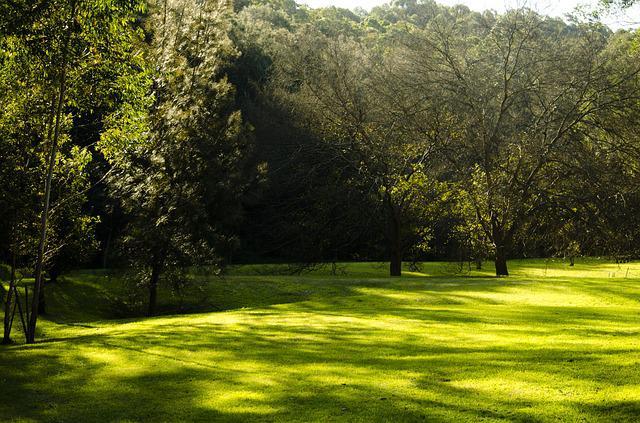
Shade can also make your Bermuda turf thin and patchy.
Bermuda grass is not very tolerant to shade. So, if you are growing Bermuda grass in an area with tall buildings, dappled sunlight or a thick canopy, chances are that your Bermuda grass turf will be thin and patchy. To grow at its best, Bermuda grass needs at least 7 hours of sunlight in a day. If improving sunlight conditions is not an option for you, you should plant shade-resistant turfgrass such as St. Augustine.
Nonetheless, here are a few tips to improve sunlight conditions on your lawn. First, cut the trees around your yard and let the sunlight come in. Also, you can try establishing a lawn away from tall buildings. And if nothing else is feasible, you can try using a sun reflector. However, it will only work for smaller lawns.
There are also some hybrid varieties of Bermuda grass in the market that can grow well even with four hours of sunlight in a day. However, they might be expensive and will not suit the needs of everyone.
How Do I Make My Bermuda Grass Greener?
Even though Bermuda grass goes pale and brown in winters due to dormancy, Bermuda grass provides a deep green look in summer and spring. On top of that, if you provide your Bermuda grass with adequate fertilization and water, it will look even brighter and greener. Here’s how you can do it:
Apply An Iron Supplement
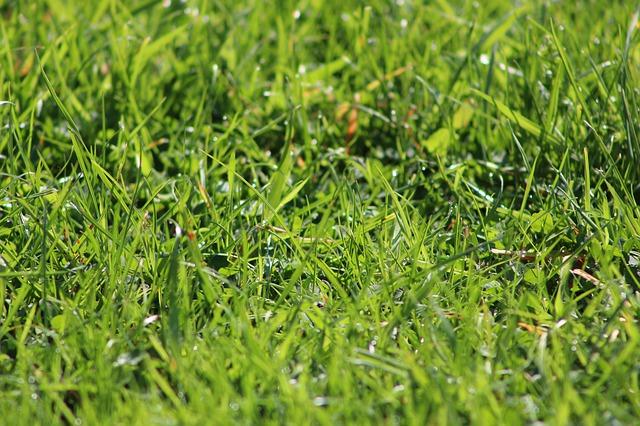
Despite all lawn care efforts, grass can still appear pale due to chlorosis.
If you think you are following a proper care plan and still your Bermuda grass appears yellow or pale, it might be due to chlorosis. However, there is no reason to worry. Chlorosis can be fixed with a simple iron supplement. Iron enhances chlorophyll, a green pigment present in plants.
However, it would help if you kept in mind that an iron supplement is not a fertilizer alternative. Depending on your soil requirements, you will still need to use adequate fertilizers to keep your grass green and healthy.
Add A Nitrogen Fertilizer
Nitrogen is a crucial component of plants and their cellular machinery. If your grass has a nitrogen deficiency, no matter how hard you try, the grass will not reach its true potential, both in terms of growth and look. Adding nitrogen fertilizer to the lawn can help boost grass growth and development, making your lawn look fuller and greener.
However, we highly recommend that you take a soil test before you use any fertilizers or supplements on your lawn. A soil test will put you on the right path toward finding the underlying problem behind a pale lawn. You will know exactly which nutrient you need to add to the lawn to promote green and healthy leaf growth.
Frequently Asked Questions (FAQs)
Can you overwater Bermuda grass?
It is highly recommended that you should not overwater your Bermuda grass. Overwatering can make your lawn soil compact, and the increased moisture in the lawn will make the grass more prone to fungal diseases. Instead, you should water your grass early in the morning so that excess water gets evaporated from the surface and only deeper soil layers retain moisture for healthy root and grass growth.
How do I make my Bermuda grass dark green?
It’s simple. Keep your grass healthy, adequately watered, and fertilized. Fertilize the grass when it is dry and then deep water your grass to make sure that the nutrients reach the roots. Also, mow your lawn low and frequently, which will help your lawn look neat, clean, green, and serene.
How to fix patchy Bermuda grass?
If there are naked bald spots on your Bermuda turf, it might be due to insufficient watering or poor quality soil. To mitigate the issue, you will need to figure out the exact problem of making your lawn thin and patchy. So, check your watering schedule and soil pH and see if the grass is adequately fertilized. Once you have found and fixed the issue, overseed the lawn by planting seeds in the bare spot, and soon you will have a lush green thick lawn.
Does sand help Bermuda grass grow?
Adding sand to Bermuda grass can do more harm than good. So, we suggest that you do not use sand on your lawn to help it grow thicker and faster. It is because sand from unknown sources can introduce unwanted plants (weeds), worms, and other potential problems to your lawn. Sand should only be used in turf areas to fill holes, fix thatch buildup or cover bare tree roots.
What does lime do to Bermuda grass?
As already stated, Bermuda grass grows best in a soil pH of around 5 to 7. So, if your soil is too acidic, you can add some lime to it, which will help you fix the acidity issue of your lawn. However, do not also use too much lime as it can make the soil alkaline, which is also harmful to the Bermuda lawn.
Sources for Further Reading
- Overseeding Bermudagrass Lawns with Annual Ryegrass. (2018). The University of Arizona – Cooperative Extension. Retrieved 29 April 2022, from https://extension.arizona.edu/overseeding-bermudagrass-lawns-annual-ryegrass
- Bermudagrass Yearly Maintenance Program. (2022). Clemson University Cooperative Extension. Retrieved 29 April 2022, from https://hgic.clemson.edu/factsheet/bermudagrass-maintenance-calendar/
- Selecting an Appropriate Bermudagrass Variety for Pastures – Oklahoma State University. (2019). Retrieved 29 April 2022, from https://extension.okstate.edu/fact-sheets/selecting-an-appropriate-bermudagrass-variety-for-pastures.html
Now that you know how to make bermuda grass thicker, make sure to check out our other articles:
Spiky Weeds That Can Ruin Garden Beds (And How To Get Rid Of Them?)
What Is Digging Holes In Your Lawn? Causes and Solutions
What Is The Best Way To Kill Weeds Permanently? A Simple & Easy Guide







